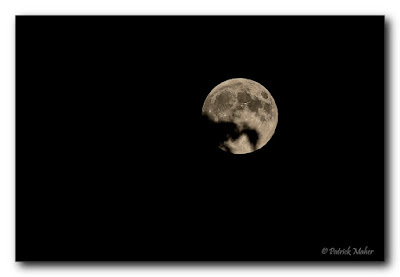Eclipse Obstacles
 |
| Waiting for the moon to rise above the treeline... |
As is the case when trying to accomplish anything, there were some obstacles to overcome when shooting the eclipse the other night.
First, I should mention that there were a few things working in my favor which is unusual.
The weather was good with clear skies at the same time as a major astronomical event. This combination has been a rarity in my lifetime.
My health was doing quite well this particular day so I there were no major health problems to drag me down. (Plus, I pre-medicated with extra medications, just in case.) I was exhausted but I easily found a solution to that problem... just set up the tripod at the living room window and shoot out the window!
The fact that these three things came together for one event was amazing... a rare lunar eclipse... on a night when we had clear skies... and also a day when I was feeling relatively well... this was amazing.
 |
| Power lines and telephone lines getting in the way... |
I knew the eclipse was going to be dark but I didn't realize how dark until the time came! I've never attempted to shoot a lunar eclipse before because our skies had always been obscured by clouds whenever one occurred in the past. When our planet's shadow started eclipsing the moon, I started to wonder just how dark it would get... unfortunately, I quickly realized that it got dark enough to make focusing extremely difficult.
While looking back at my series of images, I checked my exposure settings... the difference in exposure between the first images of the full supermoon and the blood red eclipsed moon is just over 12 stops! Each decrease in light by a "stop" means my amount of light halved. So, in this case, my scene darkened by half more than 12 times... that is a huge range in light!
On the positive side, as the moon was eclipsed darkening our night sky, the stars were sparkling more brightly and spectacularly in the night sky.
Some other problems arose due to shooting out our living room window... trees were in the way and utility lines were strung across my view for part of this event. I would need to work around this since I decided to confine myself to our living room window. I jockeyed this way and that way... raised the camera up... then down... in order to get around utility lines. Big stationary trees posed a problem though.
 |
| A tree in our yard putting an end to my view from our living room window as the moon continued to sweep behind this tree. |
At the end of my series... exactly five minutes before totality when the moon is completely shrouded in our planet's shadow... the moon started skirting behind a big tree just forty or so feet from my perch in our living room window. This time, there was nothing I could do. It did, however, give me a valid reason to just call it a night! Fortunately, I knew I had enough shots of this rare event at this point.
Back to my difficulties with focusing... the moon was dark once it was in the Earth's shadow. My camera's autofocus would not work nor did I expect it to work. That being said, I didn't realize how difficult it would be to actually see enough to focus manually!
My camera has a focus zoom feature which allowed me to zoom in on this darkened moon... and my camera also has a feature called focus peaking which highlights hard edges... but, the problem was that I couldn't see any hard edges to put into focus.
Some people may think you can just twist the focus barrel to infinity to set focus this far away... wrong. Today's lenses twist beyond infinity to have a little leeway for adapters, varying focal lengths and wide variances in temperature. In this case, I had to carefully nudge the barrel in and out just shy of infinity. Infinity was clearly out of focus. Manually focusing was difficult to say the least.
This was definitely a learning experience and it was an experience which will help me with shooting the night sky in the future. I even learned some things about my camera's extended set of complicated features and settings!
The next thing I would love to capture is the Milky Way lighting up the night sky on a moonless night...
Comments
Post a Comment